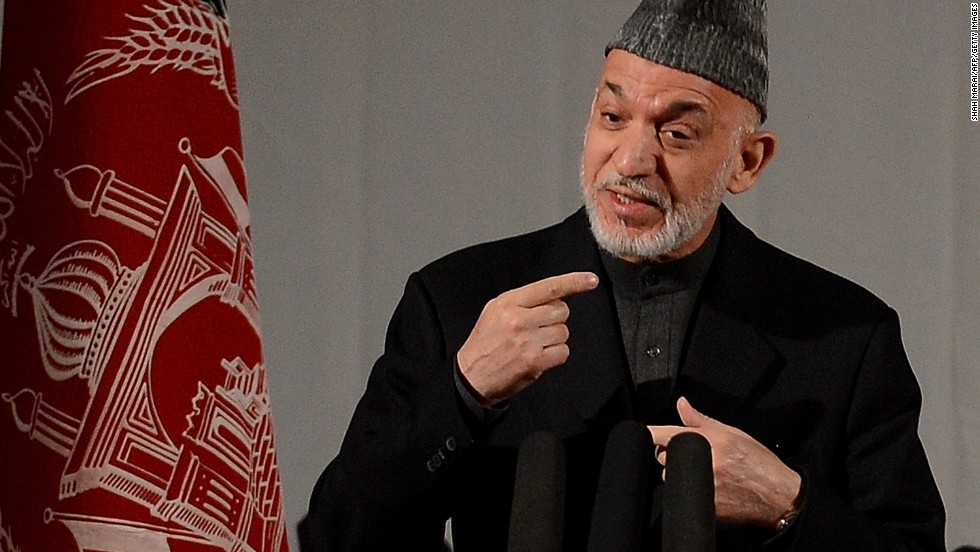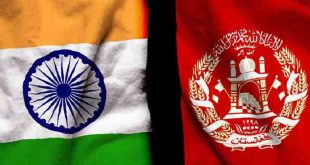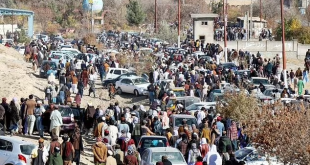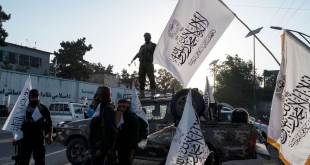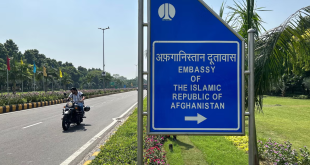AT-KABUL: The former president Hamid Karzai at the Raisina Dialogue in New Delhi said that state entities must not be allowed to support, shelter and finance terrorist organizations.
He said that South Asian countries must move beyond the atmosphere of mistrust in the region as well as of militant extremism in pursuit of geo-strategic gains.
Following is the full transcript of Hamid Karzai’s speech.
Her Excellency Sushma Swaraj
Her Excellency Chandrika Kumaratunga
His Excellency Abul Hassan Mahmud Ali
Honorable Foreign Secretary S. Jaishankar
Honorable Sunjoy Joshi
Excellencies, Ladies and Gentlemen,
I am glad to be back in India and to attend the inaugural session of the Raisina Dialogue. I wish to thank our hosts, Observer Research Foundation and the Ministry of External Affairs of India, for the meticulous organization of this conference and for the very warm welcome and hospitality extended to us in this historic city of New Delhi. I am confident that today’s forum is an important opportunity to deliberate on our common vision of a peaceful and prosperous Asia and to explore the challenges and opportunities of regional integration.
Ladies & Gentlemen,
As we gather here today, our part of the world is witnessing two contradictory trends. On the one hand, the great economic rise of Asia, led by global giants China and India, is bringing prosperity to hundreds of millions of people. On the other hand, we see the continuing rise of militant extremism with deadly and painful consequences for our larger region and beyond.
Under these circumstances, needless to say, our ability to promote one trend further and to stop the other sooner, will determine the course of our common future. Perhaps, it is necessary to look back at our past and see how we did it then. For centuries, our common continent of Asia was the commercial, intellectual and spiritual hub of the world where ideas, goods and people crisscrossed and connected civilizations.
Today as we try to revive those routes and networks, there are a plethora of initiatives underway in the form of strategies, regional organizations, transport corridors, infrastructure projects, trade and transit agreements, and banks which will support integration and connectivity across the continent. To just name a few, India’s Connect Central Asia, China’s One Road One Belt, development of new ports such Chabahar-Zaranj, the North-South Transport Corridor, TAPI, CASA1000, Asian Infrastructure Investment Bank, Eurasian Economic Union, and multiple trade and transit agreements between countries of the region are all fate-changing endeavors that will contribute to greater connectivity and integration.
Ladies & Gentlemen,
As the Silk Route once cut across geographical barriers from Europe, India and China, we want Afghanistan to once again become a land-bridge connecting South Asia to Central Asia and the Middle East. The realization of this vision for Afghanistan and the region is dependent on the following:
Foremost, we must move beyond the current atmosphere of mistrust in South Asia. The nature of relations between some countries in South Asia is a major factor adversely affecting security and prosperity of the entire region. At the heart of this predicament lies the use of militant extremism in pursuit of geostrategic gains.
In this context and in regards to relations between Afghanistan and Pakistan, while there is tremendous goodwill and deeply cordial ties between the people of both countries, the troubled relationship between Afghanistan and the establishment in Pakistan continues to be the most notable impediment to regional connectivity and lasting peace. During my presidency, I visited Pakistan more than twenty times, with utmost enthusiasm and sincerity, to address our mutual concerns and to take concrete steps towards improving our political and economic ties. From the Pakistani perspective, peaceful and friendly relations with Afghanistan were conditioned on the recognition of the Durand line, one of the very negative legacies of the Colonial rule, and the right to influence the nature of our relations with one of our closest and oldest friends.
In the past fifteen years, I have constantly underlined the impossibility of the recognition of the Durand Line by Afghanistan; while expressing Afghan desire for friendly and cooperative relations with Pakistan.
In regards to Afghanistan’s foreign relations, we have clearly demonstrated to our brothers in Pakistan that our sense of sovereignty and independence is the single most cherished value for which we have sacrificed a great deal in the course of our history and for which we are known globally. We respect Pakistan’s freedom to pursue its independent relations with any country in the world. Afghanistan will surely exercise the same prerogative. We have also clarified to them that our relations with any country in the region and beyond will not be to their detriment. While promotion and use of militant extremism can surely boomerang, a strategy of cooperation based on a civilized relationship will help both countries rise and prosper together.
Secondly, we must strive to realize the full potential of Afghanistan’s centrality as a transit hub and as a nexus of regional connectivity. Afghanistan provides the most efficient and the shortest route between China and Iran, between India and Central Asia, and between Russia and South Asia. The main disconnect in this web of stability and prosperity is Afghanistan’s lack of access to India and India’s lack of access to Afghanistan and Central Asia through Pakistan. This must be fixed if we are to create a fully integrated and stable region where each single country would benefit and prosper.
We also expect that the presence of US and NATO will provide a conducive environment for regional stability and help Afghanistan benefit from greater connectivity and integration. Just a few days ago, China’s first ever cargo train reached Tehran after two weeks of journey through our Central Asian neighbors. Plans are also underway for the construction of another rail and road link between China, Afghanistan and Iran, which will cut the distance considerably. These are significant projects for the revival of the silk route. As improved relations between Iran, US and Europe also augur well for our region, we must fully capitalize on the ensuing opportunities for greater trade and connectivity. We, in Afghanistan, do not wish to be bypassed in the wider regional connectivity arrangements and no one should be under the illusion that an isolated, disconnected and unstable Afghanistan would not affect the broader visions of connectivity and stability of the entire region. In the same vein, no other country should be denied the opportunity to benefit from greater regional connectivity.
Thirdly, we must seek a coordinated approach to connectivity between India and China. Close cooperation and confluence of interests between India and China is imperative for stability and will unleash unprecedented opportunities for the region and beyond. Afghanistan fully supports India’s Connect Central Asia strategy and China’s One Belt One Road initiative and wishes to be active stakeholder in these grand visions. Only positive symmetry between India and China can generate a win-win outcome and create a mutually assured inclusion greatly benefiting regional peace and prosperity. I believe in the wisdom and aspirations of the leaders of both countries and I am encouraged to see positive steps being taken by both nations.
For Afghanistan, we wish to have the best of relations with both China and India and we are intent on deepening those ties further. During my presidency, I actively engaged with China to establish a comprehensive partnership and I am grateful that the leadership in China responded very positively. Today, Afghanistan-China relations are comprehensive and deeply friendly.
With India, ladies and gentlemen, as you already know, we have deep-rooted centuries old relations encompassing political, economic and cultural aspects of our lives. We in Afghanistan are proud to call India our best friend. Two months ago, Prime Minister Narendra Modi visited Kabul to add to the many great contributions of India by inaugurating the Afghan Parliament built with generous assistance of India; an icon symbolizing India’s friendship with Afghanistan. Prime Minister Modi’s speech on this occasion was historic and greatly appreciated by the Afghan people. His words were not only heartfelt, but rich with an astute understanding of our shared history, and its diverse mosaic of cultural and civilizational prides. It captured the essence of the long history of our friendship and the mutual fondness of our people that bond India and Afghanistan together. No doubt, the India-Afghanistan friendship is exemplary and will be an asset for fostering cooperation across the region.
Finally, ladies and gentlemen, we must seek regional solutions to our common security challenges. We must recognize that our region will not fully reap the benefits of economic connectivity if terrorism and radicalism continue to cast a dark shadow over our potential and impede our progress.
Despite efforts by the international community, terrorism is far from being defeated and is rather spreading across the wider region. New militant extremist elements such as ISIL have emerged, threatening the stability and security of our countries and causing unprecedented violence and destruction. Moreover, we must not tolerate state entities harboring, supporting and financing terrorist networks as instrument of policy. We must join hands in destroying the elaborate terrorist infrastructure in our region.
Ladies & Gentlemen,
It is imperative for regional powers China, India and Russia to play a leading role in a system of regional security that would strengthen domestic capacities and mobilize regional resources in an integrated manner. In this context, the role of regional organizations such as SCO and SAARC is of paramount importance. It is equally important to build international partnerships that would truly advance a cooperative, common and inclusive security paradigm, enabling Asia and the West to respond effectively and jointly to the diverse security challenges.
Ladies & gentlemen,
Our common vision for a secure and prosperous future can be achieved if we move beyond a narrow definition of national interest and zero-sum games. Our vision is not a Utopian dream. It can and must be realized.
Thank you very much.
 Afghanistan Times
Afghanistan Times
